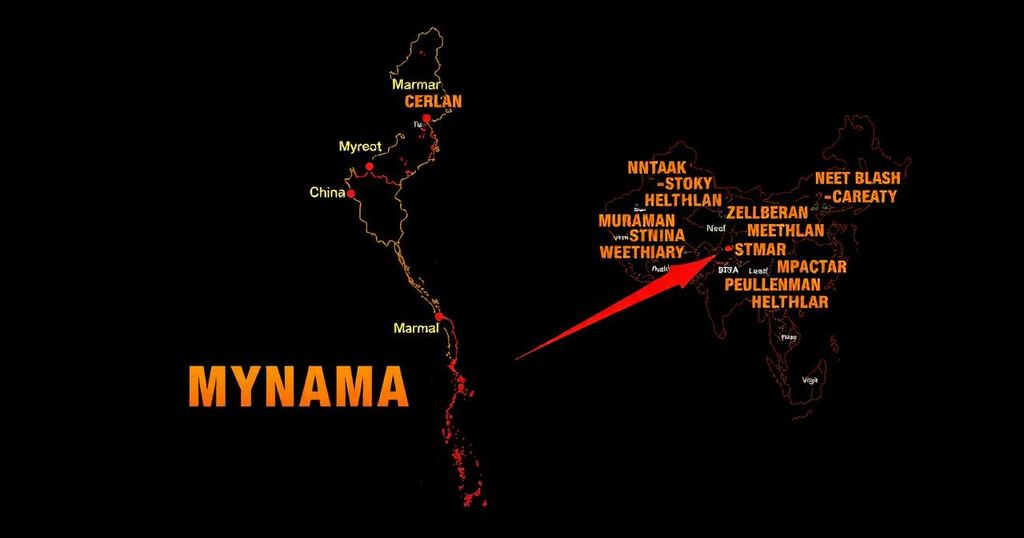Myanmar Civil War Disrupts Key Trade Route for China
Myanmar’s civil war is obstructing the Chinese-Myanmar Economic Corridor, a vital project aimed at enhancing trade and energy access. The military junta’s weakened control post-coup endangers investments, while China’s hedging strategy complicates its role amidst escalating violence. Ultimately, this conflict underscores China’s critical need for stable energy supply chains and regional influence.
Myanmar’s ongoing civil conflict has emerged as a significant obstacle to Beijing’s ambitious plans for a crucial trade route, jeopardizing the construction of the Chinese-Myanmar Economic Corridor. This corridor was envisioned to facilitate Myanmar’s access to global markets via the Indian Ocean, with the dual objectives of economically uplifting the impoverished nation and advancing Chinese investments in energy and the extraction of rare earth minerals. However, following the 2021 coup that ousted Myanmar’s elected leader, the military junta has struggled to maintain control over significant portions of the country, which threatens the viability of this multibillion-dollar initiative. Analysts perceive China’s approach as a strategic dilemma, characterized by its historical tendency to back both the ruling junta and the opposition factions in Myanmar. Lucas Myers, a prominent China analyst, emphasized that this “hedging strategy” allows China to safeguard its interests regardless of the conflict’s outcome. Nevertheless, the escalating violence and ongoing issues, such as the trafficking of Chinese nationals by Burmese cyber scammers across the border, pose complex challenges for China. As such, while Beijing’s vested interests in stabilizing Myanmar place it in a potential position to mediate peace talks, its motives may not necessarily align with the best interests of the Burmese populace. China’s economic ambitions in the region further underline the urgency of the situation. The China-Myanmar Economic Corridor is integral to China’s broader strategy to influence regional dynamics in South Asia and ensure the security of its energy supply chains. With an increasing reliance on the Malacca Strait for maritime trade—accounting for 90% of its trade in 2022—and forecasts suggesting that by 2030, 80% of China’s oil imports will come from abroad, it is critical for Beijing to find alternative routes. The successful completion of the trade route through Myanmar would provide an overland avenue for importing oil and gas, reinforcing China’s economic and political clout in the region.
The context of this situation arises from Myanmar’s civil war, which intensified following the military coup in February 2021. The conflict has not only destabilized the country but has also hampered foreign investment and infrastructure projects. China, which has significant economic interests in Myanmar, had originally intended to use the Chinese-Myanmar Economic Corridor to facilitate trade and energy imports while simultaneously boosting Myanmar’s economy. However, the ongoing violence and instability have made it increasingly difficult to realize these goals. Analysts note that China’s dual support for both the military junta and the opposition illustrates its desire to maintain influence, while also navigating the complexities arising from deteriorating conditions within Myanmar.
In summary, the civil strife in Myanmar poses a substantial threat to China’s strategic economic ambitions encapsulated in the Chinese-Myanmar Economic Corridor. China’s traditional policy of hedging its bets complicates its ability to effectively negotiate peace and stability in the region. The challenges arising from this internal conflict not only jeopardize economic projects vital to both nations but also highlight China’s dependency on secure energy routes, pressing the urgency of a resolution that safeguards investments while promoting the welfare of the Burmese people.
Original Source: www.semafor.com








Post Comment